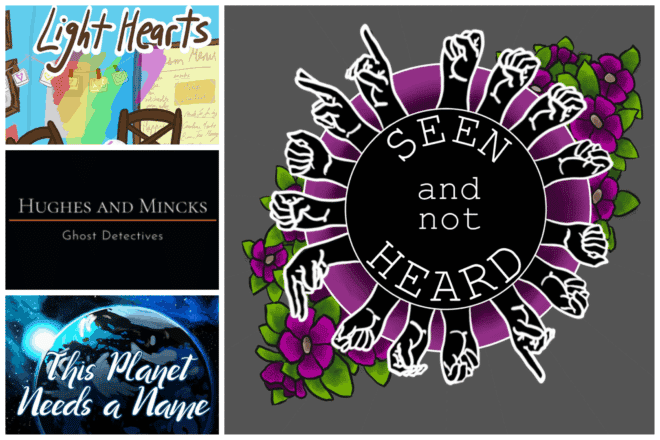Jewish Representation in Audio Drama (and Why it Matters)

There are as many ways to be Jewish as there are Jews in the world—hell, someone probably figured out a new way to be Jewish in the last five minutes. From the Haredim to the Reform, those born into the religion to converts, Montreal bagel stans to die-hard New York bagel defenders, Jews cannot be defined in a narrow way.
As creators, we talk a lot about representation, but we don’t always get into why it matters beyond a vague “it’s important to see everyone reflected in media” statement. While that’s absolutely true, because the way marginalized people are presented in our media affects how they are viewed in real life, it goes way beyond just slapping an Ashkenazi surname on a character and calling it a day. Not to say that’s not a valid form of representation in its own way – there are plenty of people for whom that’s where their connection to their Judaism stops – but we need to see more variation in these characters in audio drama before we can actually claim to be representative.
Read more: Most De(a)f Representation in Podcasting
Upon entering the world of audio drama, I found so many opportunities to not only create Jewish characters for myself to play, but to create Jewish characters who were vastly different from one another, who approach their Judaism and practice their religion – or not – in their own way. My Jewishness is a big part of my identity, and I jumped at the chance to see it reflected in ways that felt real, natural, and respectful in the audio dramas I work on.
The point is this: there is no one way to portray Jewish characters. There is no way to portray all of Judaism in one go.
When I was cast in This Planet Needs a Name, the creator, Evan Tess Murray, worked closely with each of the actors to craft our characters from the ground up. We were given reign to help invent these people, to define who they were and what drove them. Zahava Silberberg was born of my desire to see a practicing, religious Jewish character in this setting. Many sci-fi stories, especially those set far into the future, imply that humans have evolved past the concept of religion, and I thought it would be interesting to take a different approach. The first time we meet Zahava, we hear her say a blessing over a piece of cheese, sing a lullaby in Hebrew, and muse to her late husband and wife – the latter of whom was a rabbi – about what it will mean to start life over on an entirely new world. Another character, Cyrus, gives Zahava the gift of challah and candles along with her new house, and Zahava instructs each of the Nameless Crew to choose a day of the week as their day of rest – their own Shabbat.
Jewish history is filled with examples of times of persecution, of violence, of genocide. To see a character like Zahava means that Jews not only survived this far into the future, but have thrived and kept traditions alive. Zahava embodies the value of tikkun olam, which means “repair of the world”. It guides her in her decision-making and leadership and informs her entire worldview. In This Planet Needs a Name, to repair the world meant to leave the old one behind and start anew, to form a new earth so that humanity may continue. Zahava is someone who knowingly signed up to live out the rest of her days with just a handful of other people as her only company, leading an uncertain life into an even less certain future, all so that what remains of the world may have a chance. Zahava’s Judaism is not only her religion, but her philosophy, culture, history, and future.
Of course, not all Jews are particularly religious, but many still retain a connection to their religion in some way. This is the case for Bet Kline in Seen and Not Heard, who describes herself as believing in God “sometimes” when speaking to her rabbi. The rabbi more or less says they feel a similar way, and later states that they’re no more of an authority on God than Bet is – they just did more of the reading. Rather than this show focusing on the religion of Judaism, it uses certain parts of the philosophy and culture to tell the story. The rabbi prescribes rest and community rather than prayer as a remedy for Bet’s difficulties.
Read more: Seen and Not Heard: On Hearing, On Listening
The story itself takes place around the High Holidays and specifically touches on Rosh Hashanah and Yom Kippur. While the closest we ever get to a religious declaration from Bet is a reference to her “semi-piousness in direct proximity to Yom Kippur,” she still observes these important days. She is at a tipping point in her life around Rosh Hashanah, and while she celebrates in a secular way – no mention of God but plenty of mention of the dinner menu – the beginning of the self-reflective Days of Awe occur at this moment in Bet’s life in a way that spurs her into taking more assertive action in the next episode. She touches on what Yom Kippur really means (not seeking forgiveness, but practicing atonement) when she confronts her mother Elaine about her lack of support for Bet’s new life as a deaf person. She gives Elaine a direct, specific suggestion for how amends might be made for recent hurts, and we see Bet begin to make much more progress toward healing.
By drawing on the importance of these holidays and Bet’s relationship to her Judaism without actually making the story about religion, without making it Jewish People Doing Jewish Things Jewishly, it allowed me to touch on the way Jewish identity informs other areas of life. Bet may or may not actually fast on Yom Kippur, but she for damn sure takes what it represents seriously and applies it in actionable ways in her personal life.
And then you have the least religious of the bunch, Mincks from Hughes and Mincks: Ghost Detectives and Janine from Light Hearts. Both are canonically Jewish, but neither even makes mention of it until the holiday special episodes. In Janine’s case, it’s particularly offhanded, just a bit of talk about latkes and menorahs and some reflection on how Chanukah was celebrated when she was a kid.
The episode with Mincks, however, entitled “Eight Ghosts, Nine Opinions”, leans hard into using Jewishness as a basis for comedy, and even veers into the stereotypical at times. This is a difficult balancing act, but the base of successful Jewish comedy that doesn’t end up being harmful lies in A) being written by a Jew who has the cultural awareness and connection necessary, B) not using the humor to actually make a statement about Judaism, and C) approaching the characters from a place of kindness and positivity.
I often see people say that they’d like to write Jewish characters but aren’t sure how, and that they worry about the possibility of accidentally leaning into dangerous rhetoric. This concern is absolutely valid, and is actually a very valuable thing to feel – antisemitism is as alive as ever, and it is vital to avoid feeding into it. As with any other sort of representation, the key is to approach it responsibly. Do the research. Ask the questions. Hire the sensitivity readers. Be willing – without doubling down – to accept criticism of your portrayal if it is offered. If a poor attempt at representation earns more than a sigh and a weary “goyim gonna goy”, it’s serious enough to be addressed and corrected.
Actually? Scratch that.
Address and correct it if it gets the “goyim gonna goy” reaction. We’re tired.
Do the research. Ask the questions. Hire the sensitivity readers.
The point is this: there is no one way to portray Jewish characters. There is no way to portray all of Judaism in one go. There are, however, necessary steps to take in order to ensure that characters are created in ways that are safe and that do not put real Jewish people in danger. Steps that help dispel the notion that we are some sort of monolith, that we are interchangeable. Not all of us are American, white, and Ashkenazi. It’s especially important, if you are a member of a religious majority or are part of the majority culture regardless of your religious beliefs, that you examine your portrayals closely. Depending on how you were raised, there may be a lot of what you consider the norm that is actually influenced by religion (when breaks from school or work are scheduled, for example). If you want to create Jewish characters, it may require more self-reflection than you expect – don’t shy away from it!
As is my right as a Jew, I’m going to leave you with a conclusion in the form of a joke:
Two Jews stayed up all night, debating the existence of God. By sunup, they had come to the conclusion that there was no God, never had been and never would be. They parted ways and went home, armed with this new and unshakable knowledge.
The next day, the first Jew walked past the synagogue on their way to work and saw the second inside, kippah and tallit on, praying. Confused, the first went inside and approached the second.
“What are you doing here?” the first Jew asked. “Didn’t we just agree that there’s no such thing as God?”
The second Jew shrugged at the first and said “What’s that got to do with anything?”













Comments
Comments are closed.